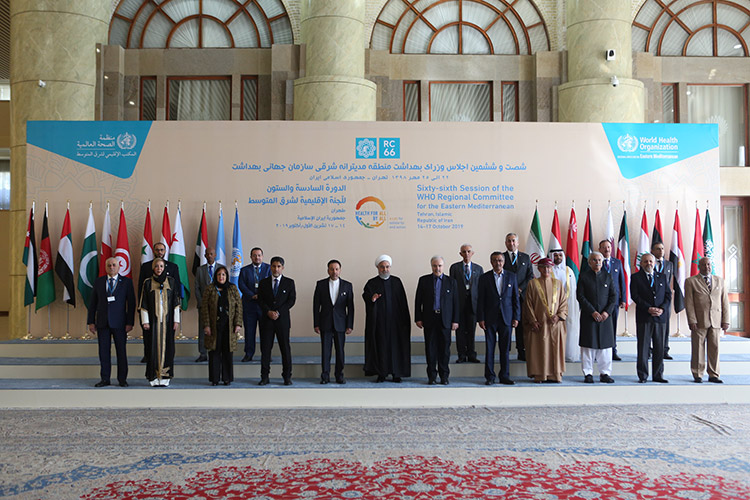
Tehran, 15 October 2019 ‒ The 66th session of the WHO Regional Committee for the Eastern Mediterranean was inaugurated today in Tehran, Islamic Republic of Iran, in the presence of HE Dr Hassan Rouhani, President of the Islamic Republic of Iran, Dr Tedros Adhanom Ghebreyesus, WHO Director-General, Dr Ahmed Al-Mandhari, WHO Regional Director for the Eastern Mediterranean and HE Dr Saeed Namaki, the Iranian Minister of Health and Medical Education. The Regional Committee is being attended by ministers and high-level officials from countries of the Region and representatives of international, regional and national organizations. The theme of this year’s session is “Working together for greater impact in countries”.
Addressing members of the Regional Committee, President Rouhani highlighted the progress the Islamic Republic of Iran has made over the past four decades, resulting in an increase in life expectancy from 56 to 76 years, as a consequence of the improved health care services provided to the whole population and the stability and peace enjoyed by the country. The President noted that the country is about to become self-sufficient in meeting its needs for medicines, with local manufacturers currently producing 95% of needed medicines. He praised the role of Iranian physicians and health care workers, and those of the world, for their sacrifices in helping humanity.
In his opening remarks at the beginning of the ceremony, Dr Al-Mandhari expressed the importance of the Regional Committee as a chance to review recent health developments, share successful experiences and expand the horizons for WHO’s work in the Region.
“We firmly believe that health is a key prerequisite for, and not a product of, development. Realization of health will significantly and positively affect the productivity of individuals and communities and raise their educational and living standards”, he said.
The Regional Director expressed concern over the deteriorating health status of people in the Region due to conflict, natural disasters, epidemics and political strife, with the related negative consequences for the provision and availability of health services in some countries.
“The health situation in our Region is grim, but we should not lose sight of the commendable efforts that many people and organizations are making in response.”
In his opening remarks, Dr Ghebreyesus acknowledged the Islamic Republic of Iran as a health leader in the Region, rightly recognized for its innovative approach to primary health care, and welcomed President Rouhani’s commitment to delivering health care for all Iranian citizens through the country’s Health Transformation Plan.
“This has contributed significantly to major improvements in maternal and child health, and the prevention and control of noncommunicable diseases,” he said.
“Public investments in health have increased and out-of-pocket spending has decreased. Health workers are now better paid, infrastructure has been modernized, and insurance coverage is near universal.”
Welcoming the members of the Regional Committee, Dr Namaki stressed the full commitment of the Islamic Republic of Iran to all WHO and United Nations resolutions related to achieving the Sustainable Development Goals (SDGs), and to ensuring the vision of health for all, by all.
“Over the past years, the Islamic Republic of Iran has established 17 000 health centres through which we cover 100% of the population in rural areas and around 90% of the population in cities. Our plan is to provide affordable health care services and ensure social protection to all the people”, he said.
During the first session that followed the opening ceremony of the Regional Committee, the Regional Director presented his annual report on the work of WHO in the Region. The presentation of the annual report included many examples of WHO’s work with Member States, with a special focus on the road ahead and an in-depth look at Vision 2023, including some of the main challenges and WHO’s strategy for tackling them over the next few years.
Related links
Annual report of the Regional Director 2018


